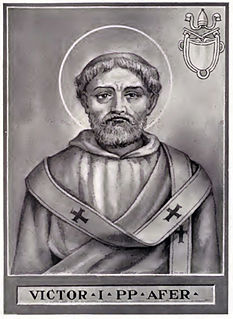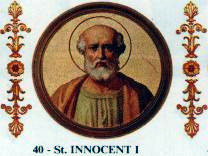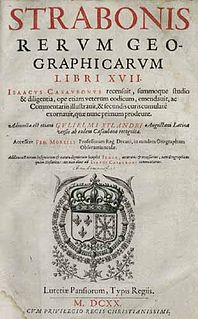
Pope Marcellus I was the Bishop of Rome or Pope from May or June 308 to his death in 309. He succeeded Pope Marcellinus after a considerable interval. Under Maxentius, he was banished from Rome in 309, on account of the tumult caused by the severity of the penances he had imposed on Christians who had lapsed under the recent persecution. He died the same year, being succeeded by Pope Eusebius. His relics are under the altar of San Marcello al Corso in Rome. His third-class feast day is kept on January 16.

Pope Victor I was Bishop of Rome and hence a pope, in the late second century. He was of Berber origin. The dates of his tenure are uncertain, but one source states he became pope in 189 and gives the year of his death as 199. He was the first bishop of Rome born in the Roman Province of Africa—probably in Leptis Magna. He was later considered a saint. His feast day was celebrated on 28 July as "St Victor I, Pope and Martyr".

Pope Innocent I served as the Pope of the Catholic Church from 401 to his death in 417. From the beginning of his papacy, he was seen as the general arbitrator of ecclesiastical disputes in both the East and the West. He confirmed the prerogatives of the Archbishop of Thessalonica, and issued a decretal on disciplinary matters referred to him by the Bishop of Rouen. He defended the exiled John Chrysostom and consulted with the bishops of Africa concerning the Pelagian controversy, confirming the decisions of the African synods. The Catholic priest-scholar Johann Peter Kirsch, 1500 years later, described Innocent as a very energetic and highly gifted individual "...who fulfilled admirably the duties of his office".

Strabo was a Greek geographer, philosopher, and historian who lived in Asia Minor during the transitional period of the Roman Republic into the Roman Empire.

The Roman Catholic Archdiocese of Tours is an archdiocese of the Latin Rite of the Roman Catholic Church in France. The archdiocese encompasses the historical Gallo-Roman province of Civitas Turonum and the French province of Touraine. Since 1790 it has corresponded with the departement of Indre et Loire. Erected in the 3rd century, the diocese was elevated in the 5th century.

Swithun was an Anglo-Saxon bishop of Winchester and subsequently patron saint of Winchester Cathedral. His historical importance as bishop is overshadowed by his reputation for posthumous miracle-working. According to tradition, if it rains on Saint Swithin's bridge (Winchester) on his feast day it will continue for forty days. The precise meaning and origin of Swithun's name is unknown, but it most likely derives from the Old English word swiþ, 'strong'.
Alexander of Constantinople was a bishop of Byzantium and the first Archbishop of Constantinople. Scholars consider most of the available information on Alexander to be legendary.

Henry was a medieval English clergyman. He came to Sweden with Cardinal Nicholas Breakspeare in 1153 and was probably designated to be the new Archbishop of Uppsala, but the independent church province of Sweden could only be established in 1164 after the civil war, and Henry would have been sent to organize the Church in Finland, where Christians had already existed for two centuries.
An archdeacon is a senior clergy position in the Syriac Orthodox Church, Church of the East, Chaldean Catholic Church, Anglican Communion, St Thomas Christians, Eastern Orthodox churches and some other Christian denominations, above that of most clergy and below a bishop. In the High Middle Ages it was the most senior diocesan position below a bishop in the Catholic Church. An archdeacon is often responsible for administration within an archdeaconry, which is the principal subdivision of the diocese. The Oxford Dictionary of the Christian Church has defined an archdeacon as "A cleric having a defined administrative authority delegated to him by the bishop in the whole or part of the diocese." The office has often been described metaphorically as that of oculus episcopi, the "bishop's eye".

Saint Theophilus the Penitent or Theophilus of Adana was a cleric in the sixth century Church who is said to have made a deal with the Devil to gain an ecclesiastical position. His story is significant as it is the oldest story of a pact with the devil and was an inspiration for the Faust legend. His feast day is February 4.
Henry Holbeach was an English clergyman who served as the last Prior and first Dean of Worcester, a suffragan bishop, and diocesan bishop of two Church of England dioceses.

The Geographica, or Geography, is an encyclopedia of geographical knowledge, consisting of 17 'books', written in Greek by Strabo, an educated citizen of the Roman Empire of Greek descent. Work can have begun on it no earlier than 20 BC. A first edition was published in 7 BC followed by a gap, resumption of work and a final edition no later than 23 AD in the last year of Strabo's life. Strabo probably worked on his Geography and now missing History concurrently, as the Geography contains a considerable amount of historical data. Except for parts of Book 7, the complete work is known.

Felix of Burgundy, also known as Felix of Dunwich, was a saint and the first bishop of the East Angles. He is widely credited as the man who introduced Christianity to the kingdom of East Anglia. Almost all that is known about the saint originates from The Ecclesiastical History of the English People, completed by Bede in about 731, and the Anglo-Saxon Chronicle. Bede praised Felix for delivering "all the province of East Anglia from long-standing unrighteousness and unhappiness".
Alexander de Kininmund was a 14th-century Scottish churchman. The first mention of Alexander occurs when, as a canon of Dunkeld he is one of three ambassadors sent by King Robert I of Scotland to Avignon in 1320. The purpose of this embassy was to present a letter to Pope John XXII known as the Declaration of Arbroath. As a papal chaplain and lawyer, he was well qualified to argue the Scottish cause, and Barrow makes a strong case that he was, in fact the author of the document.
Thomas de Kirkcudbright, also known as Thomas de Dalton [de Daltoun], was a medieval prelate from the Kingdom of Scotland. He was apparently a nutritus, or foster son, of Robert V de Brus, Lord of Annandale, and seems to have been closely linked in some way to Adam de Kirkcudbright, the man who held the church of Dalton in Annandale. He was likely a native Galwegian or perhaps a native of Annandale.
Polycarpus II was the bishop of Byzantium. According to ancient sources, he remained in office for seventeen years, but Church historian Nikiforos Kallistos mentions that Polycarpus II was the bishop of Byzantium for three years. He succeeded Bishop Felix. He was in office during the rule of Emperor Antonius Pius. His successor was Athenodorus
Tyrannion was a Greek grammarian brought to Rome as a war captive and slave.
Richard Payl was a 15th-century Dominican friar. He served firstly as the Bishop of Dromore before becoming the Bishop of Mann and The Isles.










